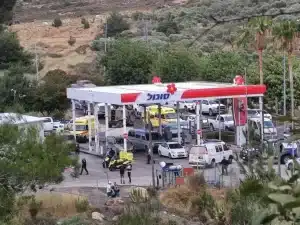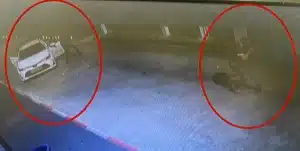On July 3, the IDF has launched a medium-scale operation in Jenin against terrorist infrastructure, following a heavy upscale in terrorist attacks from that area. Calls had been voiced to launch such an operation, rather than the continuation of surgical operations following intelligence-driven alerts. Precision airstrikes, typical to the Gaza front yet atypical for the counterterrorism warfare in Judea and Samaria, launched the operation, with ground forces taking the lead from that point. At least 7 terrorists have been killed so far.

The four Israelis murdered in the Eli terror attack by two Palestinian terrorists: Elisha Antman (17), Nahman Moradoff (17), Harel Masud (21), and Ofer Fiermann (64) (courtesy of the families)
Increasing tensions in Judea and Samaria with 4 murdered Israelis and moral equivalence to housing projects on the part of the international community | Blinken claims no foreseeable agreement with Iran | Iran rushes to express support for Putin after failed mutiny | Netanyahu’s visit to China could constitute a signal to Washington
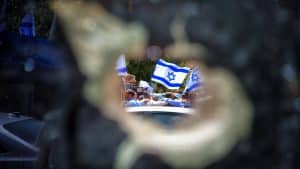
Israelis congregate to display unity and support in the Eli gas station the following day of the attack through the one of the bullet holes left in the Hummus Eliyahu window (Photo: Or Yissachar | IDSF)
Judea and Samaria: Rising Tensions
Increasing tensions around Judea and Samaria: four Jews murdered by Palestinian terrorists, IDF soldiers conduct CT operations under heavy fire, calls for a wide-scale IDF operation in Northern Samaria, Jewish settlement expansion condemned as Palestinian settlement expansion disregarded, senior Israeli decision-makers and heads of the security establishment condemn Jewish rioters
The Eli terror attack and the ensuing response
- The situation around Judea and Samaria (sometimes referred to as the “West Bank”) has seen a dramatic escalation in the second half of June albeit not irregular within several years’ perspective. The mounting use of illegal firearms and heavy IEDs (improvised explosive devices) by Palestinian militants has added a particularly challenging factor to the Israeli-Palestinian equation and further complicates the keeping of security around the region. That, added upon a considerable increase in the number of stone throwing, Molotov cocktail throwing, shooting, car ramming and other attacks.
- On June 20, two Palestinian terrorists carried out a shooting attack against civilians in a restaurant in the gas station near the Jewish community of Eli. The place is famous for its harbouring of coexistence between local Jews and Palestinians, in fuelling their cars and dining at the local Hummus restaurant. The community itself hosts dozens of Palestinian construction workers on a daily basis.
- The terrorists opened indiscriminate fire at the restaurant frequenters and at civilians at the gas station, and shot dead four Israeli residents from nearby communities, including adolescents – Elisha Antman (17), Nahman Moradoff (17), Harel Masud (21), and Ofer Fiermann (64). Four more people were injured.
- One of the terrorists was neutralized by an armed civilian present in the premises, while the other one taken down after managing to flee the scene to a nearby village by a special police squad (Yamam) and Shin Bet operatives. Professionals who inspected the CCTV footage testified the terrorists seemed professionally trained and well-familiar with operating firearms.
- The two terrorists, Muhanned Sh’hada (25) and Haled Sabah (24) from the nearby village of Urif already served short prison sentences in an Israeli prison for stone throwing and manufacturing of IEDs in 2020. IDSF representative commented in a Knesset special committee that had minimum prison sentences been in place on top of the maximum prison sentences stipulated by Israeli law, these terrorists would have still been in prison and would not have carried out the attack.
The scene of the terror attack in the gas station near Eli (Photo: Nadav Goldstein | TPS)
The two Palestinian terrorists as captured in the Eli gas station’s CCTV cameras
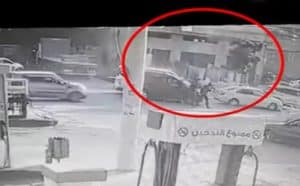
The moment of neutralizing the second terrorist who was on the run in the village of Tubas, as captured by the CCTV camera
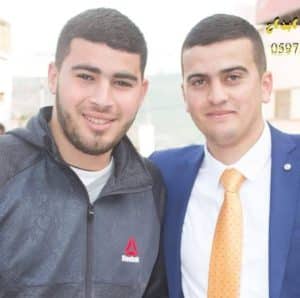
The two Palestinian terrorists from the village of Urif, Muhanned Sh’hade (25) and Haled Sabah (24)

One of the terrorists, Sh’hade upon graduating from the Najah University, with a green scarf indicating his affiliation with the Hamas-affiliated Kutlah Islamiyah student association
Deteriorating security situation in Judea and Samaria: %211 increase in Palestinian terror attacks
-
In a special Knesset Sub-Committee discussion on the security around the traffic routes in Judea and Samaria held on June 27, representatives from the IDF and the police submitted statistics on the rising Palestinian terror wave since the beginning of 2023 compared to the same period in 2022:
- 53 Palestinian attacks in 2022 // 167 in 2023 on the main Routes 60, 90, and 443 that cross the region, that constitutes a 211% increase
- 59 attacks on civilians
- 108 attacks on IDF forces
- 1,628 popular terrorism incidents including 1,369 stone throwing attacks, 174 Molotov cocktail attacks and 85 IED attacks
- 157 friction incidents
- 25 agricultural sabotage incidents
- 1,140 vehicles committing serious felonies were confiscated since November 2022
- The IDF and Shin Bet also reportedly thwarted over 400 major attacks since the beginning of 2023 alone, including 300 shooting attacks, kidnapping and suicide bombing.
- Jewish residents of these areas voiced grave protests on their serious sense of insecurity, calculating risks when considering leaving their communities to the roads and reporting on a deterioration in their capacity to conduct a peaceful routine. They also reported serious insecurity on the roads as Palestinians often manifest wild driving, making threats from drive-by cars and culminating in stone throwing, Molotov cocktail throwing, and shooting attacks.
Jewish settlement expansion condemned, Palestinian settlement expansion ignored or financed
- In response to the attack, Minister Bezalel Smotrich in coordination with Prime Minister Netanyahu and Defense Minister Gallant has approved additional 1,000 housing units in the nearby area of the attack. This policy has been characteristic of political factions that see this response as an appropriate response to attacks that seek to drive Jewish people out of these areas by more deeply entrenching their presence there.
- Approved housing projects have broken a new record this semester, with more than 13,000 approval housing unit since January alone – breaking by more than doubling the previous record from 2020. The Israeli government has also approved a fast-track route for housing approvals, with only two stages rather than six and while forestalling the need for re-approval by the MoD after each step.
- It is to be noted that the increased amount of housing project approvals is part of the current Israeli government’s declared policy and was agreed upon as part of the agreements between the Likud party and the other parties forming the coalition.
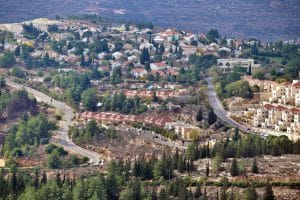
The Israeli government approved another 1,000 housing units near the site of the Eli terror attack, bringing the total number of approved units in Judea and Samaria to a record 13,000 within one semester alone (The Jewish community of Eli | Shutterstock.com)
- As opposed to the approved housing units, illegal Jewish outposts have also been constructed. Yet while illegal Jewish settlements have counted for only 4,382 structures in April 2022, illegal Palestinian settlements, as part of the Palestinian Authority’s overt policy of taking over Area C, are constructed unchecked and unbridled with 81,317 structures. Within one year, the Palestinians have constructed over 5,000 illegal structures in Area C, in standing violation of the Oslo Accords, tantamount to the entirety of illegal Jewish structures in the past 20 years (Regavim).
- The PA has made it a priority, as outlined in its “Campaign for Area C” plan, to “make true on the Palestinian national goal of [including] the majority of the West Bank within Palestinian sovereignty” and to “take the initiative to hasten the end of occupation by… putting facts on the ground” (the Fayyad Plan).
- However, international condemnations have been singling out the Israeli approved projects, disregarding the illegal Palestinian settlements. The United Nations has condemned “housing units plans in the Occupied West Bank” as “impeding the ability to achieve a viable Two-State solution, and a just, lasting, and comprehensive peace”, calling the Israeli government to “immediately and completely ceases all settlement activities” (June 28) alongside a condemnation by the United States’ Department of State and the European Union’s EEAS.
- These illegal Palestinian outposts are not only disregarded, but partially financed, as manifested in the EU’s decision to contribute over 500 million EUR thus far to this project. These intentions to accelerate support for Palestinians in Area C as part of the future Palestinian state were stated in the 2011 EU document “Area C and Palestinian State Building”, later furthered in 2013, 2015, the European Joint Strategy (EJS) in support of Palestine 2017-2020 and later EJS 2021-2024. In June 2022, a confidential document narrated by the EU’s Office of Representative to the West Bank, Gaza and UNRWA called for a “European Joint Development Programme for Area C”, referring to the plan to integrate Areas A, B, and C as a “Cluster Master Planning”.
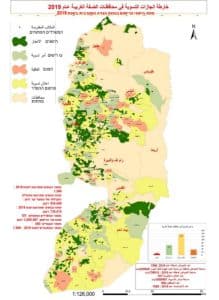
The Fayyad Plan to take over Area C as outlined in a 2019 Palestinian Authority document (Israeli Ministry of Intelligence report: “Palestinian Campaign Over Area C”)
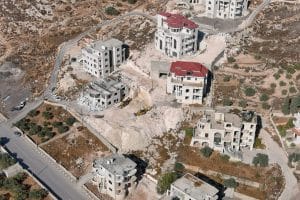
Illegal Palestinian structures in Area C, partially funded by the European Union (Photo: Regavim)
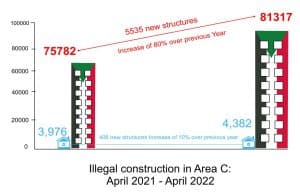
Growth of Palestinian versus Israeli illegal structures in Area C between April 2021 and April 2022 – Palestinians built more illegal structures within 1 year than Israelis within 20 years (Regavim)
IDF counterterrorism operations in Jenin: ever more challenging hostile combat environment
- Several IDF counterterrorism operations in Jenin, with the objective of arresting terrorist cells plotting imminent attacks, have seen an increased use of IEDs and live ammunition on part of local Palestinian militants and resulted in the injury of several soldiers. [See the Monitor for more details]
- On June 21, an Israeli “Zik” drone attacked a car containing three Palestinian gunmen who carried out an attack on soldiers in the Jalame checkpoint (Jenin governorate), were on their way to carry out another attack, and had previously carried out a series of shooting attacks. The three gunmen were killed due to the targeted bombing, carried out for the first time in Judea and Samaria since 2006. The Palestinian Islamic Jihad (PIJ) said that two belonged to the organization, where one was the commander of the Jenin Brigades, and the third identified as a member of the Al-Aqsa Martyrs Brigades. IDF spokesperson Brig. Gen. Danny Agari said that the three were Hamas and PIJ militants, and called it “not targeted killing, but rather threat removal,” since “we identified means, intent and shooting.”
Rocket launching attempts from Judea and Samaria are a warning sign to Israeli decision-makers
- An irregular incident of rocket launching from Jenin toward Israeli communities in the Gilboa region has taken place on June 26 morning. These failed launches, one landing just a handful of meters away from launching point and the other 80 meters, are an indicator to the Palestinian militant groups’ intention to develop rocket capabilities in Judea and Samaria in addition to the advanced capability of Hamas and PIJ in Gaza. During Operation “Shield and Arrow”, Head of the Shin Bet Ronen Bar approved the IDF has confirmed that a squad of rocket launchers was arrested around the Jenin Refugee Camp.
- Ongoing IDF counterterrorism operations are the driving factor behind the failure of these attempts to materialize into a prelude of a full-scale, Gaza-like rocket launching capability. According to criticism voiced by senior military officials following the 2005 Disengagement from Gaza and the 1994 “Gaza and Jericho First” move as part of the Oslo Accords, the vacuum left there has triggered a process in which preliminary and amateur rocket launches such as the ones seen this month in Jenin has morphed into a strategic threat with long-range missiles and medium-range rockets covering most of Israel.
- The Disengagement from Northern Samaria in 2005 has not reached the binary situation as in Gaza, since the IDF kept its ability to act inside cities, yet the lack of Jewish communities in the area and the avoidance by IDF to fervently thwart terrorist infrastructure there up until Operation “Wave Breaker” have largely been a driving factor behind the incubating terrorist networks there.
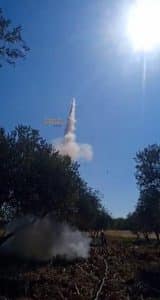
Documentation distributed by Hamas of the failed rocket launching from Jenin toward Israeli cities
Calls for a wide-scale operation in Jenin
- In recent years, and in particular since the onset of Operation “Wave Breaker” in March 2022, the IDF has taken a surgical, rather than comprehensive approach to deal with Palestinian terrorism activity originated in Areas A and B in Judea and Samaria.
- In Gaza, the binary approach Israel initiated in the 2005 Disengagement led to a physical separation that limited the IDF’s freedom of counterterrorism action to either full-scale operations or limited airstrikes, that cannot fully handle power buildup in a dense urban setting. In Judea and Samaria, IDF, police and Shin Bet special units operate regularly to arrest or take down terrorists and confiscate terrorism infrastructure – illegal firearms, manufacturing workshops of IEDs and armament, etc.
- However, surgical operations have been proven as having a “glass ceiling”, as the rising wave of planned attacks supersedes the ability to thwart them individually are requires a more in-depth approach. 29 Israelis have been murdered since the beginning of 2023 by terrorists originated in these areas, despite the successful thwarting of hundreds of other attacks, leading to the killing of 150 terrorists since 2022 and the arrest of hundreds of others.
- Therefore, there have been increased calls to launch a wide-scale military operation around Northern Samaria while focusing on the Jenin area, in order to target terrorist capabilities and infrastructure, rather than pinpointed arrests and confiscation of armament. Above all, such an operation should restore deterrence, as a new generation of Palestinian youth has grown up with no familiarity of the IDF’s might as manifested during the 2002-2005 Operation Defensive Shield.
- Intelligence and surgical operations must be complemented by a continuous friction with terrorist plotters in their environment of activity, adding checkpoints and the boosting of operating manpower.
- Finally, the current Israeli policy that makes the point of complete separation between terrorist infrastructure and the catalyst factors behind them, chief among them the Palestinian Authority, should be recalculated. No price tag has been claimed from the PA that continues to fund terrorist stipends, promise up-front funds for any terrorist, and incites the youth with anti-Semitic and anti-Zionist content in the education system. Israel has avoided criticism or steps against the PA, fearing its collapse or the halting of security cooperation with it, a policy that has clearly not resulted in more cooperation on the part of the PA nor catalyzed it to reassess it terrorist-driving policy.
- Israel should also pressure the international community, chiefly the United States, to support a more rigid and assertive policy against the PA in order to change its policy and decrease tensions and terrorism.
Violence on part of groups of Jewish residents and the international moral equivalence
- Following the attack in Eli, groups of Jewish youth have raided villages such as Turmus Aiya, where they torched 15 houses and some 20 vehicles, and Umm Saffa, where several houses and vehicles were also set on fire. Violent clashes between Jewish and Palestinian youth were also noted.
- While the Palestinian Authority’s policy is to praise assailants (such as the Fatah’s official Twitter page, public declarations by Chairman Mahmoud Abbas and the official pages of local Palestinian municipalities), the IDF has arrested several Jewish assailants and has also assisted local Palestinians in managing the ensuing damages.
- Heads of the Israeli security establishment even published a joint statement condemning these acts. The IDF Chief of Staff, Head of Shin Bet and the Police General Commissioner as “contradicting every Jewish and moral value and constitute nationalistic terrorism plain and simple. We are committed to combat these phenomena. Security forces act against these assailants… This violent fuels Palestinian terrorism, hurts the State of Israel and the international legitimacy of the security forces to combat Palestinian terrorism, and diverts the security forces’ attention from handling their main mission – Palestinian terrorism.”
- The Israeli President, Prime Minister, Defense Minister and prominent opposition figures also unequivocally condemned these attacks.
-
The response on the part of the international community has highlighted these violent attacks while refusing to strongly urge the Palestinians to reject the way of terrorism. Most responses either ignored the murder in Eli or made a moral equivalence between vandalism and damage to property – an inadequate response by local Israelis to the incessant terrorism on the roads on the part of Palestinians – and the murder of innocent Israelis.
- The United Nations condemned “all acts of violence against civilians” while putting both the Eli murder and the ensuing response in the same basket, while also making a misleading statement that Israel’s actions in Jenin “resulted in seven Palestinians killed”, rather than terror operatives. The UN ignored the continuous torching of Israeli property and attacks on Israeli vehicles by Palestinians, overtly encouraged by Palestinian authorities, while focusing on the acts of a handful of Israelis who were subsequently arrested by Israeli authorities and will be duly charged.
- The European Union has “equally” condemned both cases, dubbing the area “Israel/Palestine” albeit the lack of recognition of Palestine on the part of most EU member states. The US ambassador to Israel stated his deep concern about “the civilian deaths and injuries that have occurred in the West Bank these past 48 hours”. The embassy of Bahrain chose to strongly condemn “settler violence” while ignoring the Eli murder altogether.
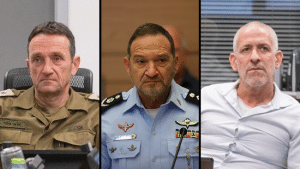
IDF Chief of General Staff Lieut. Gen. Herzi Halevi, Commissioner of the Police Yaakov Shabtai and Head of Shin Bet Ronen Bar published an irregular joint letter condemning violence on part of Jewish groups in Palestinian cities
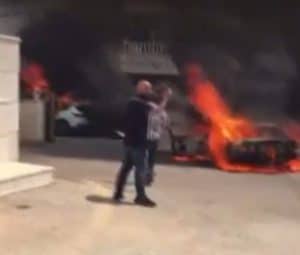
Torched vehicles and apartments in the Palestinian village of Turmus Aiya by groups of Jewish rioters as revenge for the Eli terrorist attack (published by Mako news, no credit assigned)
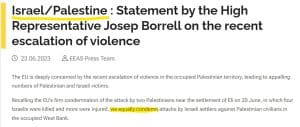
EU statement equally condemning damage to property caused by Jewish rioters in Palestinian villages as a revenge for the Eli terrorist attack, and the attack itself where four Israelis including teenagers were murdered, and calling the area “Israel and Palestine” albeit the lack of recognition of Palestine on the part of most EU member states
Blinken: No foreseeable Agreement with Iran
- US Secretary of State Anthony Blinken declared on June 28 that no new nuclear deal with Iran is on the horizon, despite rumours about upcoming “unofficial understandings” with Iran. “There’s no agreement in the offing,” Blinken told the Council of Foreign Relations, “whether Iran chooses itself to take actions, or maybe better put, not to take actions that further escalate the tensions not only between us, but with other countries, we’ll see by their actions.”
The Inter-Superpower Competition in the Middle East: Russia and China Attempt to Step Into the US’s Shoes
Netanyahu’s Planned Visit to China is not Meant as a Signal to Washington, but Should be Viewed Through the Following Lens
- Israeli Prime Minister Netanyahu announced that he accepted an invitation to visit China after the Jewish Holidays. In light of Israel’s strategic partnership with the United States, and the latter’s complicated relations with China, Netanyahu made sure to avoid a diplomatic crisis with Washington as the trip was reportedly coordinated with the White House since last month, and Netanyahu himself announced the visit privately during a meeting with a bipartisan delegation from Congress. Netanyahu’s office confirmed to Israeli news agency Makor Rishon the reports on a planned visit on June 27 and stressed that “security and intelligence cooperation between Israel and the United States is in an all-time high. [He] stressed that the United States will always remain Israel’s vital ally, and has no replacement.”
- During the confidential part of the Knesset’s Foreign Affairs and Defense Committee on June 13, as reported by Walla News, Netanyahu reportedly said that China’s increasing involvement in the region can be seen as a positive development from Israel’s point of view, since it forces the United States to increase its own involvement in the region. Netanyahu’s office refused to comment. A senior Israeli official told Walla News that the visit will be “an entirely mundane and routine visit, that constitutes no signal or political message to anyone.”
- Some politicians as well as security experts voiced their criticism and concerns regarding this move, calling it a miscalculation in light of the already-tense political relations between the Netanyahu government and the Biden administration, in light of the fact that Netanyahu is yet to be extended an official invitation to the White House since coming back into office.
- This comes against the backdrop of the growing involvement in the region on the part of China, which is stepping up to take America’s place in the Middle East. Among the most prominent manifestations of this shift are Beijing’s successful mediation in the reconciliation between Saudia Arabia and Iran, and the strategic partnership between China and the Palestinian Authority following Chairman Mahmoud Abbas (Abu Mazen)’s recent visit to Beijing.
The ”Almost” Uprising in Russia: Implications for the Middle East
- Following the halting of the move taken by Wagner Force commander Yevgeny Prigozhin, in which he threatened Russia with a military uprising by seizing control of the Russian city of Rostov-on-Don and beginning a march to Moscow with the stated aim of removing the military leadership, some lessons can be drawn as far as the Middle East’s axes of alliances go.
- Iranian president Ibrahim Raisi was quick in declaring Iran’s support for President Putin. In a phone call that took place the day of the supposed mutiny, he expressed full support for the Russian leadership, going further than the Iranian Foreign Ministry’s announcement that the events taking place were an internal Russian matter.
- Arab world leaders also made the point of expressing their clear support for the Kremlin. Saudi Crown Prince Mohammed Bin Salman (MbS) spoke with President Putin on June 27, and expressed Saudi Arabia’s “relief” at the successful de-escalation of situation in Russia, and the Kingdom’s “wishes of further security and stability in Russia” (Saudi press).
Threats In Refusal To Draft: A Real Danger To Israel’s Military Resilience
- As part of the ongoing protest movement against the Israeli government and Knesset majority’s intention to legislate far-reaching changes in the dynamics between the judicial and the legislator, dubbed the “judicial reform”, some factions of that movement have resorted into threats of non-drafting or removing their reserve service volunteering status. Their objective was to force the government’s hand into relinquishing the legislation, a much-debated topic in Israel since January of this year.
- Leaders and Knesset members from both coalition and opposition parties have voiced their disapproval from this use of the IDF as a prop as part of the public debate in Israel, citing the People’s Army as the single most unifying banner in the Israeli society. Israel’s President Herzog, Prime Minister Netanyahu, Minister of Defense Gallant, opposition leaders such as Yair Lapid and Benny Gantz, alongside prominent figures from the IDF general staff such as Chief of General Staff Lieut. Gen. Herzi Halevy, Air Force Commander Maj. Gen. Tomer Bar and others.
- Some letters signed by mostly veteran reservists, threatening to refuse to draft when summoned, have been a major topic of controversy.
The Monitor: H2 June 2023 in numbers
TERROR ATTACKS
Israeli terror victims
4 killed victims – shooting attack
4 wounded citizens – shooting attack
8 wounded officers and soldiers – counterterrorism operations
In Detail
- June 19 | Husan (around Betlehem) | A young Palestinian threw a Molotov cocktail at Israeli security forces in the Bethlehem area. The security forces secured a road in the area after a series of terrorist acts on the road that took place against Jews recently. Palestinians also threw firebombs at Israeli troops, according to witnesses. As a response, Israeli forces used gas grenades to disperse the crowd.
- June 20 | Gas station near Eli | Palestinian gunmen associated with Hamas killed four Israelis and wounded four others at a gas station. According to the initial investigation by the army, a car containing two gunmen drove up to the gas station and began shooting with assault rifles at those in ‘Hummus Eliyahu’ restaurant. Then, they focused their attack on drivers at the gas station itself. One of the terrorists was killed on the scene by an armed civilian, and the other fled but was eventually caught and killed.
- June 24 | Qalandiya checkpoint (north of Jerusalem) | A civilian Israeli security guard was shot by a Palestinian gunman at the Qalandiya checkpoint north of Jerusalem. In an official statement, Israel Police disclosed that the assailant walked up to the checkpoint bordering Jerusalem and Ramallah at around 2:40 a.m., where he launched shots at the forces. The attacker was killed and the security guard sustained light injuries.
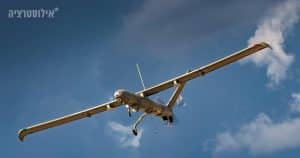
IDF spokesperson released an illustration of the attack UAV that took down a squad of three Palestinian terrorists, affiliated with Hamas and PIJ, after committing a series of shooting attacks
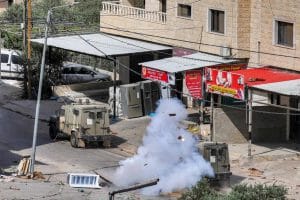
IDF forces operating in Jenin under heavy fire on June 19 (Photo: t.me/Yediotnews)
ON THE PALESTINIAN SIDE
Counterterrorism operations
- June 19 | Jenin | Israeli security forces entered Jenin to arrest two wanted Palestinians involved in terrorism against Jews. The security forces were attacked by armed terrorists using explosive devices during the raid. Eight Israeli security forces members were injured in the crossfire and the explosion. Five Palestinians, mostly militants shooting at IDF soldiers and a 15-year-old adolescent, were killed as Israeli forces fired back. Irregularly, a helicopter was called to evacuate injured soldiers, and a combat helicopter was also irregularly involved in taking militants.
- June 21 | Jalamah (around Jenin) | An Israeli drone attacked a car containing three Palestinian gunmen affiliated with Hamas and PIJ who were involved in terrorism, for the first time in Judea and Samaria since 2006
Technology and arms deals
- June 14 | Germany and Israel’s Arrow 3 Deal | Germany has released funds for a major $4.3 billion USD deal with Israel to purchase Arrow 3 air defense systems. Germany is aiming to finally strike the deal by the end of 2023, as part of its rearmament program in light of the escalating security threats around Europe with the outbreak of the Russian war against Ukraine. The deal costs around $1 billion USD more than originally planned (Reuters). Israeli companies of Rafael and the Israel Aerospace Industries as well as the Homa directorate in the Ministry of Defense are leading the bilateral negotiations. Chancellor Scholtz has made a number of statements last year, pledging to turn Germany into “the largest standing army in Europe” which will constitute a “turning point” in the country’s military history.
Holidays
June 27 | Eid al-Adha – “Feast of Sacrifice” | Holiday celebrated by Israeli Arabs and Druze

